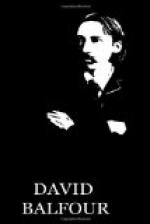The next day, Sabbath, August 27th, I had the occasion I had long looked forward to, to hear some of the famous Edinburgh preachers, all well known to me already by the report of Mr. Campbell. Alas! and I might just as well have been at Essendean, and sitting under Mr. Campbell’s worthy self! the turmoil of my thoughts, which dwelt continually on the interview with Prestongrange, inhibiting me from all attention. I was indeed much less impressed by the reasoning of the divines than by the spectacle of the thronged congregation in the churches, like what I imagined of a theatre or (in my then disposition) of an assize of trial; above all at the West Kirk, with its three tiers of galleries, where I went in the vain hope that I might see Miss Drummond.
On the Monday I betook me for the first time to a barber’s, and was very well pleased with the result. Thence to the Advocate’s, where the red coats of the soldiers showed again about his door, making a bright place in the close. I looked about for the young lady and her gillies; there was never a sign of them. But I was no sooner shown into the cabinet or antechamber, where I had spent so wearyful a time upon the Saturday, than I was aware of the tall figure of James More in a corner. He seemed a prey to a painful uneasiness, reaching forth his feet and hands, and his eyes speeding here and there without rest about the walls of the small chamber, which recalled to me with a sense of pity the man’s wretched situation. I suppose it was partly this, and partly my strong continuing interest in his daughter, that moved me to accost him.
“Give you a good-morning, sir,” said I.
“And a good-morning to you, sir,” said he.
“You bide tryst with Prestongrange?” I asked.
“I do, sir, and I pray your business with that gentleman be more agreeable than mine,” was his reply.
“I hope at least that yours will be brief, for I suppose you pass before me,” said I.
“All pass before me,” he said, with a shrug and a gesture upward of the open hands. “It was not always so, sir, but times change. It was not so when the sword was in the scale, young gentleman, and the virtues of the soldier might sustain themselves.”
There came a kind of Highland snuffle out of the man that raised my dander strangely.
“Well, Mr. Macgregor,” said I, “I understand the main thing for a soldier is to be silent, and the first of his virtues never to complain.”
“You have my name, I perceive”—he bowed to me with his arms crossed—“though it’s one I must not use myself. Well, there is a publicity—I have shown my face and told my name too often in the beards of my enemies. I must not wonder if both should be known to many that I know not.”
“That you know not in the least, sir,” said I, “nor yet anybody else; but the name I am called, if you care to hear it, is Balfour.”
“It is a good name,” he replied, civilly; “there are many decent folk that use it. And now that I call to mind, there was a young gentleman, your namesake, that marched surgeon in the year ’45 with my battalion.”




